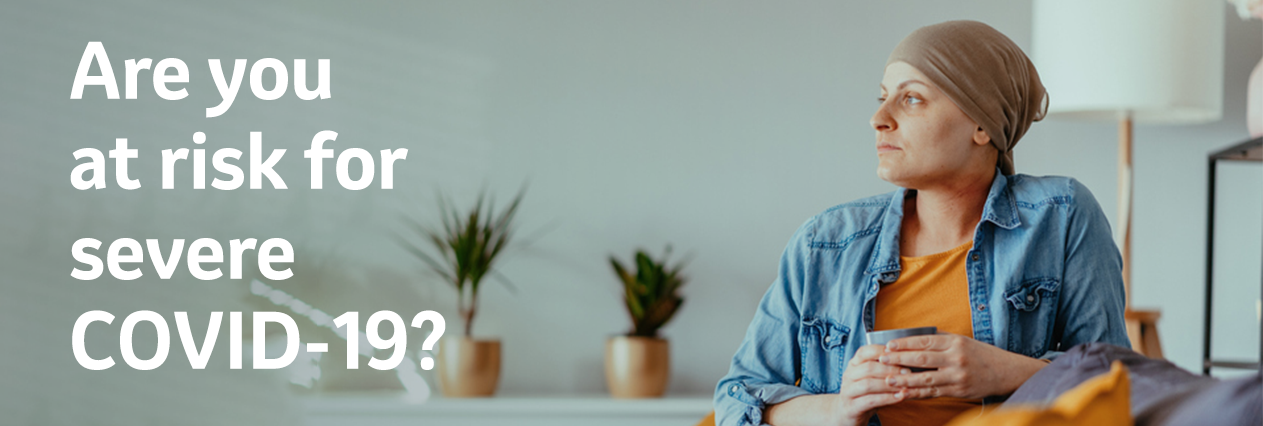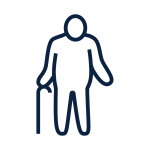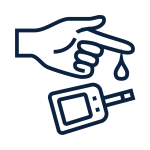
Certain population groups and those with certain medical conditions are at increased risk of severe COVID-19 illness.1
Do any of the risk factors listed below apply to you or someone you care for?
Risk factors for severe COVID-194

≥70 years of age

Obese

Cancer

Diabetes

Chronic kidney disease

Chronic lung disease

Heart disease

Neurological conditions
- Identify as Aboriginal or Torres Strait Islander
- Being male
- Being pregnant
- Being unvaccinated
- Blood cancer (such as leukaemia, lymphoma or myelodysplastic syndrome)
- Childhood cancer
- Chronic inflammatory condition requiring medical treatment
- Chronic liver disease
- Chronic lung disease
- Chronic renal (kidney) failure
- Diabetes
- Heart disease (coronary heart disease or failure)
- Living in remote area
- Living with disability
- Neurological conditions such as stroke or dementia
- Non-haematological cancer (diagnosed in the past 5 years)
- Obesity
- Older age, especially if you are over 70 years old
- Poorly controlled blood pressure
- Primary or acquired immunodeficiency
- Severe mental health condition
- Smoker
- Certain treatments, such as radiotherapy, bone marrow transplant, targeted anti-cancer therapy, immune suppressive therapy, chemotherapy or immunotherapy
What to do if you are at risk and have COVID-19 symptoms
If you are experiencing any symptoms of COVID-19, it is important to take a COVID-19 test to determine if you are infected.2
If you return a positive result, contact your doctor right away.
Test at the first sign of COVID-19 symptoms. If you test positive and are at high risk of
severe COVID-19, talk to your doctor for advice without delay.
#PlanForCovid
Tell your family and friends about planning for COVID-19.
By clicking any of the links listed below, you will be leaving the MSD website. The link you have selected will take you to a third-party website. We do not review or control the content of any third-party site. We do not endorse and are not responsible for the accuracy, content, practices, or standards of any third-party sources.
References
- Updated eligibility for oral COVID-19 treatments. Australian Government Department of Health and Aged Care. Accessed 15 August 2023.
https://www.health.gov.au/health-alerts/covid-19/treatments/eligibility - How testing works for COVID-19. Therapeutic Goods Administration. Accessed 16 March 2023. https://www.tga.gov.au/products/covid-19/covid-19-tests/how-testing-works-covid-19
- COVID-19 disease and symptoms. Australian Government Department of Health and Aged Care. Accessed 24 February 2023. https://www.health.gov.au/health-alerts/covid-19/symptoms
- Risk factors for more serious illness. Australian Government Department of Health and Aged Care. Accessed 24 February 2023.
https://www.health.gov.au/health-alerts/covid-19/advice-for-groups-at-risk/risk-factors-for-more-serious-illness - What COVID-19 test should I do? NSW Government. Accessed 15 March 2023.
https://www.nsw.gov.au/covid-19/testing-managing/get-tested-for-covid-19 - Testing for COVID-19. Australian Government Department of Health and Aged Care. Accessed 24 February 2023. https://www.health.gov.au/health-alerts/covid-19/testing
- Medicines for treating COVID-19. Health Direct. Accessed 15 March 2023.
https://www.healthdirect.gov.au/covid-19/medications - Protect yourself and others from COVID-19. Australian Government Department of Health and Aged Care. Accessed 24 February 2023.
https://www.health.gov.au/health-alerts/covid-19/protect-yourself-and-others - If you have COVID-19. Australian Government Department of Health and Aged Care. Accessed 15 March 2023. https://www.health.gov.au/health-alerts/covid-19/testing-positive#testing-positive-for-covid19




